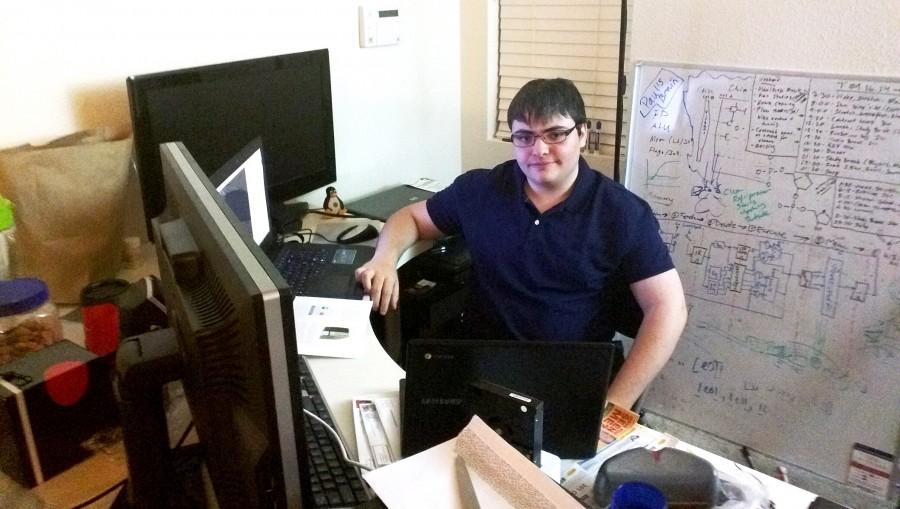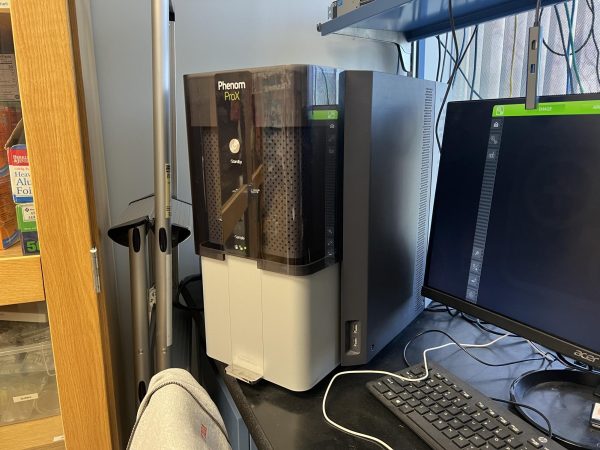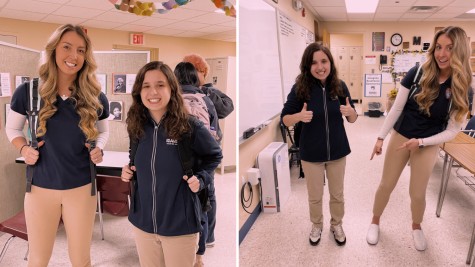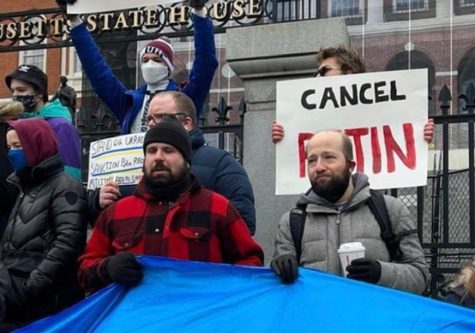From AMSA to teen CEO, he is the master of his universe
Thomas Sohmers takes an unconventional path
CEO Thomas Sohmers at his desk in the offices of REX Computing, based in Palo Alto, Calif.
A gift of $100,000 and a one-way ticket to California. It almost sounded too good to be true.
But like most lavish offers, it had a catch that would leave many people writing endless lists of pros and cons.
Accept the $100,000 grant—drop out of high school and hope for the best. Reject the offer—finish four years of tedious math homework and obnoxious history lectures.
For Thomas Sohmers, the decision was not so difficult. He became a 16-year-old AMSA dropout with a wad of startup cash, which he turned into REX Computing, based in Palo Alto, Calif.
He’s now an 18-year-old CEO, named to Forbes magazine’s latest 30 under 30 list, making him one of the most promising game-changers in his field.
This unconventional journey to success is due primarily to his personality: driven and outwardly friendly, with a disposition similar to that of a politician. He knows what he wants and he is willing to take unconventional risks to attain his goals.
When asked to describe himself in three words, Thomas cleverly avoided the question by saying that he doesn’t want to label himself.
“I like being judged by my work and not having things directly associated with me,” he said. “I’m quite the politician aren’t I?”
The $100,000 gift was a Thiel Fellowship, a kind of tech geek equivalent of a MacArthur “genius grant,” courtesy of Peter Thiel, the creator of PayPal and one of the first investors in Facebook, both multi-billion dollar companies.
Thomas and REX Computing are now making high-speed, low-energy servers that are “2,500 percent more power efficient” than other machines that do the same job, he told Business Insider last year. It promises to revolutionize the field.
It’s a long way from a lecture about the causes of the Spanish-American War.
But Thomas’ switch from high school student to all-star CEO raises a lot of questions. Was it easy for him to leave his life in Massachusetts and throw his hopes for a tech-oriented future across the country?
In Thomas’ hectic life as a CEO there are a lot of uncertainties, but his love of technology paired with his mother’s unconditional support made accepting the Thiel Fellowship a no-brainer.
Penny Mills, Thomas’ mother, explained that when Thomas submitted his application for the Thiel Fellowship they began discussing possible outcomes. As soon as he clicked the “submit” button, their chit-chat shifted from typical after-school conversation to what their reaction would be if he were selected.
“I was on board with it,” Mrs. Mills said. “I knew it was right for him. […] It’s an opportunity that you don’t just throw away.”
Hello, California
Thomas, who left AMSA in 2013 midway through his junior year, truly does not fit the mold of a typical American student, so it made sense to say hasta la vista to formal education and hello to the bright sun and even brighter future that was waiting for him in Silicon Valley.
Thomas had been chasing a Thiel Fellowship—awarded to 20-25 people per year—for some time, applying during his freshman and sophomore years as well, so working to receive it was a committed endeavor.
While most people would experience an outrageous burst of emotion after hearing they had received $100,000 and a get-out-of-high school-free card, Thomas explained that he was simply “in disbelief” upon hearing the news.
Thomas first learned about the possibility when he went on a field trip to Google’s San Francisco Bay Area headquarters during his freshman year at AMSA.
Thomas met a diverse group of people at Google. One lady, however, specifically stuck out.
“A woman from IRobot told me about the Thiel Fellow,” said Thomas, who was accompanied by former AMSA computer science department chair Kelly Powers and a few other AMSA students.
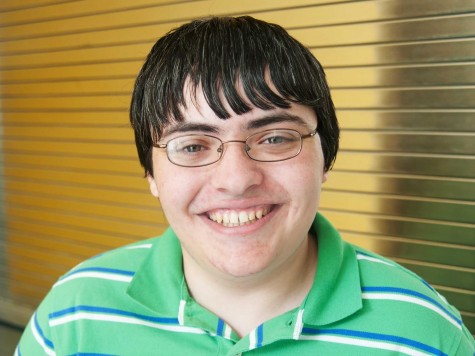
Now that the dream is a reality, Thomas, like any good CEO, spends most of his time developing his company and pushing new boundaries within his field.
His company’s main goal: “To help technology become as much of a commodity as water and electricity, so that if you need computer power it’s available cheaply and seamlessly.”
He currently works with four other people to develop new processers that are superior to current products.
“We create processors that are simpler than existing designs and more power efficient,” Thomas said.
Thomas went on to explain that creating their “first-generation chip is the company’s primary focus.”
What are the chip’s applications? Well, Thomas likes to throw around jargon like “petascale supercomputer,” “floating point operations,” and “1EEE754-2008 double precision” on a regular basis, so when asked to simplify the objectives of his company it’s no wonder he snickered.
“It’s too complex to simplify,” he said.
In terms of running a business, the most complicated thing about being CEO is “building the technology because it’s never been done before,” Thomas said.
Thomas explained that one of his main goals is to radically reduce the cost of computing.
Personal evolution
Although Thomas has already achieved great business success and he has big goals for REX Computing, his mother believes he has made great personal progress.
“He has matured quite a bit,” she said. “He is knowledgeable in his field and has learned how to network and deal with people much older than him.”
Thomas stressed that although he works with older, more experienced people, he doesn’t let his age dilute his ambition.
“If I was 50, the work I am doing would be just as important,” he said.
It’s this drive for excellence without limitation that landed Thomas recognition in Forbes for his advancements in energy conservation.
“In November I received some questions from Forbes,” Thomas said, “[but when] I heard nothing back I assumed I wasn’t selected.”
When he finally received the news, both he and his mother were elated.
“I was in a store and I screamed,” Mrs. Mills said.
Thomas said that when he found out he was selected he was both “shocked and happy.”
“Forbes is a pretty big name,” he said with a laugh.
Although he has been recognized by one of the nation’s most prestigious business magazines, it’s important to remember his humble origins at AMSA—a school that taught him more than just how to use an overpriced graphing calculator.
“My [computing] interests are not well represented in the AMSA curriculum […] [but] AMSA did teach me to go out there and interact with the world,” Thomas said.
What is most interesting, however, is that Thomas was not the stereotypical AMSA student, driven to succeed by obsessing over a perfect grade-point average, enrolling in an avalanche of Advanced Placement classes, and over-committing to extra-curricular activities.
Mike Lubawski, Thomas’ English teacher during his sophomore year, explained that Thomas is not a typical student.
“Thomas is bright but doesn’t follow the system well,” said Mr. Lubawski, currently the English department chair.
As a self-proclaimed “life coach,” Mr. Lubawski encouraged Thomas to move to California to pursue his interest in technology.
“I hope Thomas’ success will teach people that it’s not the grades you get, it’s the effort that you put into your passions,” Mr. Lubawski said.
There is no doubt that Thomas’s passion for computing is unparalleled.
“As soon as he could sit up and hold a mouse in his hand, we gave him a computer,” his mother said.
Full of surprises
Thomas’ drive to succeed is obvious, yet he is full of surprises.
Many people would be surprised to learn that he struggled socially when he was an elementary school student in Hudson.
“He was bullied from the time he was in 1st grade all the way to 5th grade,” Mrs. Mills said.
When he arrived at AMSA, things changed—his knowledge was celebrated.
This celebration of intelligence made AMSA hard to forget, so Thomas and his mom attended what would have been Thomas’s high school graduation last summer.
“Everyone was excited to see him. It was heartwarming to watch,” she said.
It’s true that many AMSA students admire both Thomas’ intellect and his character.
“If someone is a genius you think of them as being socially awkward,” junior Sam Mahler said. “But he was really friendly and the most unique smart person I’ve ever met.”
Sam admires Thomas’ decision to leave mainstream schooling to pursue personal passions.
“I would have taken the same route,” Sam said in regard to Thomas’ choice to start his own business instead of finishing high school.
Thomas knew that failing to graduate with the rest of his class was no tragedy. He always had a feeling that he wouldn’t be pursuing higher education. This feeling was solidified when he went to a conference in Austin, Texas called South by South West.
While the conference consisted of three branches, Thomas was interested in the technology aspect.
“I got the feeling that I had the capabilities to be an actual participant,” Thomas said of his desire to be an active member of the technological community.
Thomas has a diverse set of interests aside from technology. He is a rock and roll enthusiast, guitar player, and avid science fiction reader.
“He also loves history,” Mrs. Mills said. “He has a great memory. It’s incredible how his mind works. He can understand things far beyond what most adults can understand.”
Mr. Lubawski perhaps summed it up best.
“Thomas is really an old soul in a young body,” he said.
Thomas has achieved great success. There is no doubt he is a game-changer. And Mr. Lubawski believes the best is still to come.
“Thomas has accomplished things that millions of people have dreamed of and he’s only starting out,” he said.
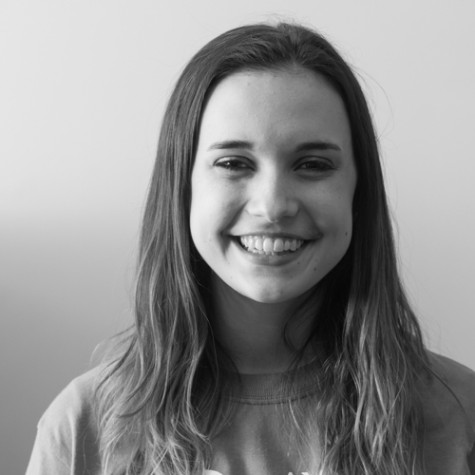
Alli Caulfield is a co-editor of The AMSA Voice. She is a senior and a resident of Leominster. She hopes to attend college in a big city to pursue her...


